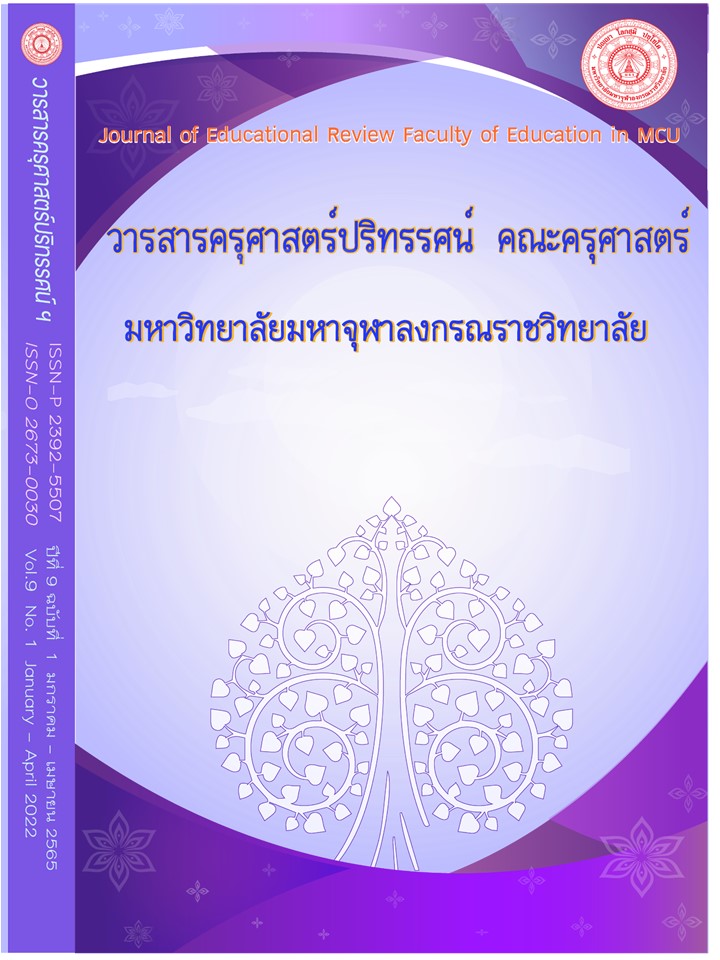GUIDELINES FOR KNOWLEDGE MANAGEMENT, ACCORDING TO BUDDHADHAMMA, SECONDARY SCHOOL, MUEANG DISTRICT, PATHUM THANI PROVINCE
Main Article Content
Abstract
The purposes of this thesis were 1) to study knowledge management according to Buddhadhamma; 2) to propose a guideline for knowledge management according to the Buddhadhamma in secondary school, Mueang District, Pathum Thani Province. Mixed methods research was used combines the methods of quantitative and qualitative research. The questionnaire was used as a quantitative data collection tool from a sample of 217 teachers and an interview questionnaire was used to collect qualitative data from five experts. Quantitative data were analyzed by using descriptive statistics consisted of mean and standard deviation whereas qualitative data was analyzed by content analysis. Results found that 1) Knowledge management according to Buddhadhamma of Secondary School, Muang District, Pathumthani Province, found that the overall level of knowledge management in all 5 areas at a high level consisted of knowledge storage, knowledge sharing, learning, knowledge inquiry, and the knowledge setting, respectively. 2) Guidelines for knowledge management according to Buddhadhamma of Secondary School, Muang District, Pathumthani Province, it was found that the knowledge of Kalyanamit was regularly heard pondering the knowledge received with thoughtfulness. There is a proper culture to promote and extend knowledge for personnel to develop new knowledge, put the knowledge gained from the exchange into practice in the work, fellowship with the knowledgeable, to share and learn together, build a network for collecting knowledge in electronic systems, apply the knowledge that has been considered and adapted to suit them, collecting knowledge for solving operational problems, and follow learning tools for effective knowledge management in schools.
Article Details

This work is licensed under a Creative Commons Attribution-NonCommercial-NoDerivatives 4.0 International License.
ทัศนะและความคิดเห็นที่ปรากฏในบทความในวารสารฉบับนี้ถือเป็นความรับผิดชอบของผู้เขียนบทความนั้นเพียงผู้เดียว และไม่ถือเป็นทัศนะและความรับผิดชอบของกองบรรณาธิการ
กองบรรณาธิการขอสงวนสิทธิ์ในการคัดเลือกบทความลงตีพิมพ์และจะแจ้งให้เจ้าของบทความทราบหลังจากผู้ประเมินบทความตรวจอ่านบทความแล้ว
ต้นฉบับที่ได้รับการตีพิมพ์ในวารสารครุศาสตร์ปริทรรศน์ คณะครุศาสตร์ มหาวิทยาลัยมหาจุฬาลงกรณราชวิทยาลัย ถือเป็นกรรมสิทธิ์ของคณะครุศาสตร์ มหาวิทยาลัยมหาจุฬาลงกรณราชวิทยาลัย ห้ามนำข้อความทั้งหมดหรือบางส่วนไปพิมพ์ซ้ำ เว้นเสียแต่ว่าจะได้รับอนุญาตจากมหาวิทยาลัยฯ เป็นลายลักษณ์อักษร
References
เตือนใจ รักษาพงศ์. (2551). การพัฒนารูปแบบการจัดการความรู้เพื่อการบริหารงานวิชาการของ สถานศึกษาขั้นพื้นฐานด้วยกระบวนการวิจัยเชิงปฏิบัติการแบบมีส่วนร่วม. ดุษฎีนิพนธ์ศึกษาศาสตรดุษฎีบัณฑิต. มหาวิทยาลัยบูรพา.
ไพโรจน์ ชลารักษ์. (2551). การจัดการความรู้: สังกัปทางทฤษฎี. นครปฐม: เพชรเกษมพริ้นติ้งกรุ๊ป.
ชูศรี วงศ์รัตนะ. (2541). เทคนิคการใช้สถิติเพื่อการวิจัย. พิมพ์ครั้งที่ 7. กรุงเทพมหานคร: เทพเนรมิต.
ธานินทร์ ศิลป์จารุ. (2557). การวิจัยและวิเคราะห์ข้อมูลทางสถิติด้วย SPSS และ AMOS. พิมพ์ครั้งที่ 15. นนทบุรี: เอส.อาร์.พริ้นติ้ง แมสโปรดักส์.
พรพิมล หรรษาภิรมย์โชค. (2554). การศึกษาสภาพการจัดการความรู้ของโรงเรียนสังกัดสำนักงานเขตพื้นที่การศึกษาในเขตภูมิภาคตะวันตก. วิทยานิพนธ์ศึกษาศาสตรมหาบัณฑิต. มหาวิทยาลัยเกษตรศาสตร์ วิทยาเขตกําแพงแสน.
พระมหาลำพึง ธีรปัญโญ (เพ็ญภู่). (2554). การบริหารงานตามหลักธรรมาภิบาลของโรงเรียนนวมินทราชูทิศมัชฌิม จังหวัดนครสวรรค์. วิทยานิพนธ์พุทธศาสตรมหาบัณฑิต. มหาวิทยาลัยมหาจุฬาลงกรณราชวิทยาลัย.
ภราดร จินดาวงศ์. (2550). การจัดการความรู้ Knowledge Management The Experience. กรุงเทพมหานคร: ซีดับบลิวซีพริ้นติ้ง.
มหาวิทยาลัยศิลปากร. (2550). การจัดการความรู้. นครปฐม: มหาวิทยาลัยศิลปากร.
รับขวัญ ภาคภูมิ. (2547). ความสัมพันธ์ระหว่างการบริหารงานตามหลักธรรมาภิบาลของผู้บริหาร สถานศึกษากับสุขภาพองค์กรของสถานศึกษา สังกัดสำนักงานพื้นที่การศึกษากําแพงเพชร เขต 1. วิทยานิพนธ์ครุศาสตรมหาบัณฑิต. มหาวิทยาลัยราชภัฎกําแพงเพชร.
วิลาวัลย์ มาคุ้ม. (2549). การพัฒนาตัวบ่งชี้การจัดการความรู้ของครูในสถานศึกษาขั้นพื้นฐาน สังกัดกระทรวงศึกษาธิการ. ดุษฏีนิพนธ์การศึกษาดุษฎีบัณฑิต. มหาวิทยาลัยศรีนครินทรวิโรฒ.
Carla O’Dell and others. (1998). If Only We Knew What We Know: The Transfer of Internal Knowledge and Best Practice. The Free Press. n.p.
Cronbach, Lee J. (1971). Essentials of psychological testing. 4 th ed. New York: Harper & Row.
Inkpen. (1996). Creating Knowledge through collaboration. California Management Review. New York: Authur P. Brief.


